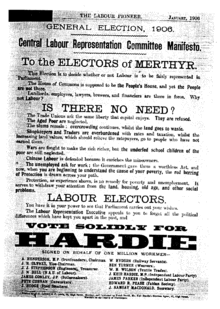Keir Hardie
James Keir Hardie (born August 15, 1856 in Newhouse , North Lanarkshire , † September 26, 1915 in Glasgow ) was a British politician ( Labor Party ). Hardie became famous as one of the founders of the Labor Party and one of its first two MPs in the UK Parliament.
Life
Early life (1856-1888)
Hardie was born in Newhouse in 1856, the illegitimate son of Mary Keir, a maid of Legbrannock near Motherwell. After his mother's marriage to the carpenter David Hardie, he took his name. Hardie grew up in poor conditions in Glasgow . From the age of eight he was forced to contribute to the earnings of his family, at times even as sole provider of his parents (among other things as a baker's messenger boy). After his mother's death, Hardie's family moved to Lanarkshire where Hardie started working in the local coal mines in 1867 .
Hardie never went to school: his mother taught him to read with the help of discarded newspapers, and he learned to write autodidactically at the age of seventeen. On August 3, 1879, Hardie married Lillie Wilson. Around the same time he began to get involved in the trade union movement. In 1880 he led the first strike in the history of Lanarkshire miners . Since he could no longer find work as a miner due to the hostility of the mine owners in Lanarkshire, he began to work as a journalist in the Scottish town of Cumnock. He also became a lay priest of the Evangelical Unionist Church. In 1886 Hardie became the secretary of the local miners' union, the "Ayrshire Miners Union" and soon afterwards the "Scottish Miners Federation", whose newspaper "The Miner" he was editor of.
Political career (1888-1915)
Originally a supporter of the Liberal Party , he distanced himself from Gladstone 's economic policy out of disappointment and began to look for a political alternative that would give greater importance to the interests of the working class. He eventually became a socialist and ran in April 1888 as an "independent Labor candidate" for the first time - unsuccessfully - for the constituency of Mid Lanark for a lower house.
On the occasion of the founding of the "Scottish Labor Party" on August 25, 1888, Hardie was appointed its first party secretary. In 1892 Hardie finally moved in as a candidate for the constituency of West Ham South with 5,268 compared to 4,036 votes, which fell by his Conservative candidate, as the second candidate for his party - after the chairman Robert Cunninghame Graham - in the House of Commons. There he stood out in the following years as an advocate of a tax progression in income tax as well as an advocate of free schooling and state pensions, as a supporter of women's suffrage and initiatives to abolish the House of Lords.
In 1893 Hardie helped found the Independent Labor Party. In 1894 he attracted attention with attacks on the form of government of the monarchy after the royal family rejected his request to mention the death of 251 coal miners in the announcement on the occasion of the birth of the heir to the throne (later Edward VIII). In 1895 he lost his lower house. In the following five years he worked mainly as a public speaker and worked as an organizer of the young Labor Party. In 1900 he organized the gathering of various trade unions and socialist groups, at which the establishment of the Labor Representation Committee, which in 1906 finally changed its name to the Labor Party, was decided.
In 1900, Hardie was re-elected to the House of Commons as representative of the constituency of Merthyr Tydfil and Aberdare during the khaki elections . In 1908 Hardie resigned as leader of the Labor Party, succeeded by Arthur Henderson . In the last years of his life, Hardie stood out as a committed campaigner for women's suffrage , the end of racial segregation in South Africa and the right of self-government for India. Hardie rejected the First World War as a pacifist. After his attempt, together with the socialists of other countries, to force an end to the war through an international general strike, he acted as a supporter of conscientious objectors and organizer of anti-war demonstrations. He died in Glasgow in 1915 after several strokes.
literature
- EB : James Keir Hardie. Died in Glasgow on September 26, 1915 . In: The True Jacob . No. 763 of October 15, 1915, pp. 8806-8807 digitized
- Emrys Hughes : Keir Hardie . Allen & Unwin, 1956.
Web links
- Newspaper article about Keir Hardie in the 20th century press kit of the ZBW - Leibniz Information Center for Economics .
| personal data | |
|---|---|
| SURNAME | Hardie, Keir |
| ALTERNATIVE NAMES | Hardie, James Keir (full name) |
| BRIEF DESCRIPTION | British politician (Labor), Member of the House of Commons |
| DATE OF BIRTH | August 15, 1856 |
| PLACE OF BIRTH | Newhouse , North Lanarkshire |
| DATE OF DEATH | September 26, 1915 |
| Place of death | Glasgow |

